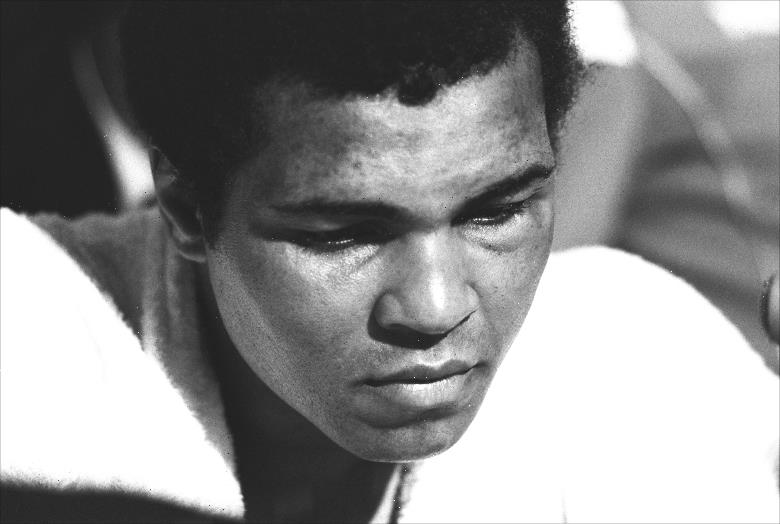A Ken Burns documentary on legendary fighter Muhammad Ali sounds like the perfect union between filmmaker and subject — it also sounds like a topic Burns would have tackled long ago. Ali’s is a name that hasn’t diminished, let alone in the five years since his death from Parkinson’s, and the iconic sports star is still considered one of the greatest fighters of all time. Burns’ documentary shows exactly why that is, but the nearly eight-hour series also manages to break down Ali as a man, his connections with religion, and the lives of the numerous contenders he sought to conquer.
Like most of Burns’ documentaries, “Muhammad Ali” is a fairly comprehensive life-to-death examination of its title character, and all the basic tenets you’d expect are there. What’s fascinating, and makes the documentary so watchable, is the various throughlines Burns posits, starting with Ali’s fighting skills. Nearly every one of Ali’s professional fights is shown, many times without any commentary outside of the live radio announcers. At several points, various talking heads will discuss why Ali was so unique as a boxer, from the way he employed dance to the way he peppered his jabs.
This leads to one of several contradictions that Burns explores. Ali was famous for predicting when his opponents would be knocked out. In several fights, interviewers discuss Ali’s tendency to string along an opponent and wear them out without scoring a K.O. until the round he predicted. In some cases, like his last fight with Floyd Patterson, many saw such self-congratulatory toying as cruel and unsportsmanlike.
Ali was a complex figure, like all people, and it’s remarkable the lengths Burns and crew go to in order to show that. He was, at times, a showman. Outside of making his predictions, he often played to the crowd, having training sessions that became more about talking to people or pretending to be held back from opponents in order to rile up a crowd. Ali was a master boxer, but he also understood the rules of media and presentation in a way that helped boxing become more of a spectacle than it already was. Just seeing video of Ali talking in his flowing, poetic language is enough to enrapture audiences, even now.
“Muhammad Ali”
PBS
But while the documentary may be named after Ali, Burns takes pains to give life to several of his opponents — both white and Black — and the various ways they were embraced by audiences. Burns illustrates how Ali was often criticized by white audiences, many of whom saw him as unpatriotic for his connections to the Nation of Islam. They often rooted for fighters like Patterson, but were really just rooting against Ali. The way these Black boxers were perceived by different communities is engaging on its own, and Burns makes a point of showing that, like Ali, they all tended to come from the same backgrounds.
No matter their similarities, it was hard for Ali to see them as anything other than beneath him. He was always cocky, but at a certain point, specifically when he was in the midst of his rivalry with Joe Frazier, he took to using racial stereotypes to denigrate Frazier. For many of the commenters, such insults are surprising and hard to understand, but it’s one of several questions asked throughout the documentary that are left unresolved, including whether Sonny Liston threw his last fight with Ali. The fact that there are still mysteries to the boxer decades later helps to elevate the docuseries for broader audiences than just boxing fans.
There’s also as much exploration of Ali out of the ring as inside it. His four wives all receive time in the documentary, though this is where Burns tries his best to move away from the stickiness of Ali’s marriages. He did marry his third wife, Veronica, while married to his second wife, Belinda, and the doc quickly races past that fact. For Belinda’s brief mention of paternity suits, there’s no mention of the two children outside of his marriages that have claimed to be fathered by the fighter.
Meanwhile, Burns seeks to dissuade past claims that Ali was a draft dodger, showing how he was initially stamped as failing the intellectual tests and then, for reasons unknown, being surprisingly shifted to 1A status. Burns leaves the audience to question whether a grander conspiracy was at play.
“Muhammad Ali” is another success story for Ken Burns, though there’s no doubt good-faith criticisms will be lobbed about the white director telling this story. This is an exhaustive look at the legend’s life that will easily draw in long-term fans of Ali as well as those who might only have seen footage of him on YouTube, making it a must-watch for sports fans and documentary lovers alike.
Grade: A-
“Muhammad Ali” premieres its first two-hour entry on Sunday, September 19 at 8 p.m. ET on PBS. New episodes will air Monday, Tuesday, and Wednesday at the same time. All four episodes will be available to stream on September 19.
Source: Read Full Article


